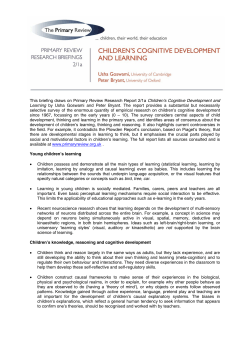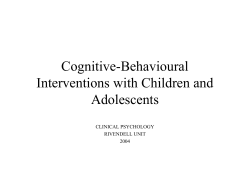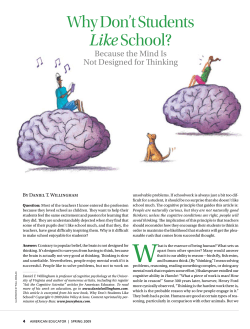
What is information? Really, what is it? © Tefko Saracevic 1
What is information? Really, what is it? © Tefko Saracevic 1 As a phenomenon … Answer: WE DON’T KNOW! ...---... ...---... ...---... ...---... ...---... ...---... ...---... ...---... ...---... ...---... ...---... ...---... ...---... © Tefko Saracevic 2 As a concept … Well, we understand it intuitively quite well We have a number of lexical definitions We use it and nobody has to define it for us it is a y’know concept We easily adapt to various connotations (differing senses) depending on the context But formally, in a scientific sense, we really don’t know what information is as a phenomenon, ...---... ...---... ...---... ...---... ...---... ...---... ...---... ...---... ...---... ...---... ...---... ...---... ...---... © Tefko Saracevic 3 As a basic phenomenon We don’t know what information is any more than we know what is energy matter gravity life knowledge Basic phenomena in physics, biology, philosophy …we don’t know what they are, BUT: ...---... ...---... ...---... ...---... ...---... ...---... ...---... ...---... ...---... ...---... ...---... ...---... ...---... © Tefko Saracevic 4 So how do we study them? We study their manifestations behavior (or behaviour if you are British) effects All scholarship, every science does this e.g. we don’t know what gravity is, but we have physical laws that describe its behavior and effects ...---... ...---... ...---... ...---... ...---... ...---... ...---... ...---... ...---... ...---... ...---... ...---... ...---... © Tefko Saracevic 5 this slide doesn’t have to do with the lecture topic but I liked the picture, so here it is ...---... ...---... ...---... ...---... ...---... ...---... ...---... ...---... ...---... ...---... ...---... ...---... ...---... © Tefko Saracevic 6 Information treated in various disciplines physics – basic property as energy, matter biology – senses neurophysiology – brain processes psychology – behavior, perception cognitive science – cognition telecommunication, computer science – signals, bits philosophy – knowledge ...---... ...---... ...---... ...---... ...---... ...---... ...---... ...---... ...---... ...---... ...---... ...---... ...---... © Tefko Saracevic 7 Information in information Again: intuitively well understood, but formally not science well stated Shannon: source-channel-destination signals not content – not really applicable Cognitive: changes in cognitive structures Several viewpoints, models emerged content processing & effects Social: context, situation information seeking, tasks ...---... ...---... ...---... ...---... ...---... ...---... ...---... ...---... ...---... ...---... ...---... ...---... ...---... © Tefko Saracevic 8 Shannon's information theory Developed a general model for communication systems, and a set of theoretical tools for analyzing such systems, by measuring information in terms of probabilities (numbers) ...---... ...---... ...---... ...---... ...---... ...---... ...---... ...---... ...---... ...---... ...---... ...---... ...---... © Tefko Saracevic 9 Shannon … reducing uncertainty Defined information in terms of probabilities developed measure of the information we get from observing the occurrence of an event, BUT ignored any particular features of the event e.g. flipping a fair coin once will give us events h and t each with probability 1/2, and thus a single flip of a coin gives us - log2(1/2) = 1 bit (Binary digit) of information (whether it comes up h or t) Information measured in bits is the reduction in uncertainty in the mind of the receiver information (in bits) is the amount of uncertainty a measure eliminates ...---... ...---... ...---... ...---... ...---... ...---... ...---... ...---... ...---... ...---... ...---... ...---... ...---... © Tefko Saracevic 10 Shannon’s impact Had great impact in treating of digital information as signals e.g maximizing capacities of channels; coding Had disappointing impact (despite many tries) where information is connected with meaning, context, humans, values the ideal to measure information in human terms is elusive but keep trying … ...---... ...---... ...---... ...---... ...---... ...---... ...---... ...---... ...---... ...---... ...---... ...---... ...---... © Tefko Saracevic 11 Cognitive – basic idea: K(S) + ΔI = K(S + ΔS) (Brookes) Information when operating on a knowledge structure produces an effect whereby the knowledge structure is changed “Information is differences that make a difference” (find who said it!) Actually, it only states the problem – “unoperational” in information systems involves cognitive, mental events only constructivists rejected it ...---... ...---... ...---... ...---... ...---... ...---... ...---... ...---... ...---... ...---... ...---... ...---... ...---... © Tefko Saracevic 12 Information manifestations Information as a process what someone knows is changed when informed; “the action of informing” (similar as Brookes) refers to cognitive changes + process of doing it Information as knowledge knowledge communicated about x (Buckland) uncertainty removal a special case refers to that which is being communicated - intangible Information as a thing data, documents with quality of imparting information - tangible refers to potential information conveyed from objects ...---... ...---... ...---... ...---... ...---... ...---... ...---... ...---... ...---... ...---... ...---... ...---... ...---... © Tefko Saracevic 13 Information in information science Three senses (from narrowest to broadest) Information in terms of decision involving little or no cognitive processing - Shannon 1. signals, bits, straightforward data - computing, telecommunication, economics, Information involving cognitive processing & understanding - Brookes 2. understanding, matching texts Information also as related to context, situation, problemat-hand, process – Buckland to some extend 3. users, use, tasks For information science (including information retrieval): third, broadest interpretation necessary ...---... ...---... ...---... ...---... ...---... ...---... ...---... ...---... ...---... ...---... ...---... ...---... ...---... © Tefko Saracevic 14 What is in a book? (for discussion in class) Cover page of a book: What is in it? ...---... ...---... ...---... ...---... ...---... ...---... ...---... ...---... ...---... ...---... ...---... ...---... ...---... © Tefko Saracevic 15 A chapte r in that book ...---... ...---... ...---... ...---... ...---... ...---... ...---... ...---... ...---... ...---... ...---... ...---... ...---... © Tefko Saracevic 16 Here is also a cover page of a book: What is in it? ...---... ...---... ...---... ...---... ...---... ...---... ...---... ...---... ...---... ...---... ...---... ...---... ...---... © Tefko Saracevic 17 A chapte r in that book ...---... ...---... ...---... ...---... ...---... ...---... ...---... ...---... ...---... ...---... ...---... ...---... ...---... © Tefko Saracevic 18 Adequacy? None of the theories about 1452-1519 information are adequate to cover fully information as a phenomenon Each covers a bit or simply describes manifestation Shannon’s theory is testable, but reduces “information” to signals only A scientific theory is one that can be refuted – tested for confirmation, rejection (Popper) 1564-1642 - they understood this ...---... ...---... ...---... ...---... ...---... ...---... ...---... ...---... ...---... ...---... ...---... ...---... ...---... © Tefko Saracevic 19 So we went to study Human information behavior “how people need, seek, manage, give, and use information in different contexts” (Pettigrew ) many models, theories, studies on a variety of aspects extends to study of web behavior Bibliometrics “the study, or measurement, of texts and information” (Norton) many studies and formal statements about structure & patterns of literatures, citations, authors, journals, texts … Bradford’s law, Lotka’s law ...---... ...---... ...---... ...---... ...---... ...---... ...---... ...---... ...---... ...---... ...---... ...---... ...---... © Tefko Saracevic 20 to be continued … We cover these in other lectures and courses and two 2005 books cover very nicely the topics of theories of human information behavior and integration of information seeking and information retrieval in context highly recommended ...---... ...---... ...---... ...---... ...---... ...---... ...---... ...---... ...---... ...---... ...---... ...---... ...---... © Tefko Saracevic 21 ...---... ...---... ...---... ...---... ...---... ...---... ...---... ...---... ...---... ...---... ...---... ...---... ...---... © Tefko Saracevic 22 ...---... ...---... ...---... ...---... ...---... ...---... ...---... ...---... ...---... ...---... ...---... ...---... ...---... © Tefko Saracevic 23 © Tefko Saracevic p.s. there is code in other slides 24
© Copyright 2025









